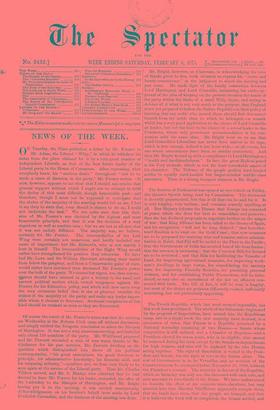Mr. Bright, however, as Chairman, in acknowledging the vote of
thanks given to him, took occasion to express his "entire and hearty concurrence" in the judgment to which the meeting had just come. He made light of the family connection between Lord Hartington and Lord Granville, intimating his entire ap- proval of the plan of keeping on the present occasion the heads of the party within the limits of a small Whig clique, and saying in defence of it what is not very much to the purpose, that England is not yet prepared to follow the Italian Republics in their policy of insisting that any noble who served them should first disconnect himself from the noble class to which he belonged,—a remark which has a very good application to the choice of Lord Granville as leader, but not the least to the choice of a second leader in the Commons, whose only prominent recommendation is his con- nection with the same class. Mr. Bright went on to say that Lord Granville's Liberalism has never been narrow in its type, which is true enough, indeed it has been wide,—at all events, for one whose associations have been so strictly aristocratic. And then Mr. Bright wound up with a compliment to Lord Hartington's "health and hard-headedness." In fact, the great Radical posed in his Tory attitude, which is not the least remarkable aspect of his character. The Tribune of the people prefers hard-headed nobles to equally hard-headed but larger-minded middle-class statesmen. There is a strong bourgeois element in Mr. Bright.


































